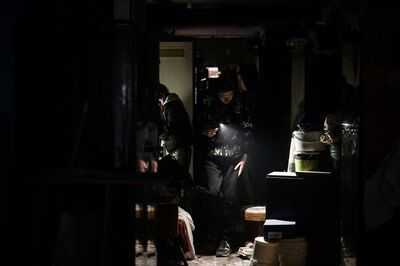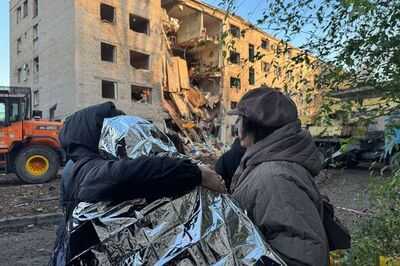The latest in a sustained Russian campaign of massive drone and missile attacks on Ukraine's energy infrastructure brought power outages and restrictions in all the country's regions on Thursday, officials said, with the Ukrainian Prime Minister describing Moscow's tactic as "systematic energy terror".
The strikes, which were the latest in Russia's almost daily attacks on the Ukrainian power grid as bitter winter temperatures near, killed at least six people, including a seven-year-old girl, according to authorities. Children between two and 16 years of age were among the 18 injured. Russia launched more than 650 drones and more than 50 missiles of various types in the attack, Ukraine's President Volodymyr Zelensky said. Ukrainian cities use centralised public infrastructure to run water, sewage and heating systems - and blackouts stop them from working. Months of attacks have aimed to erode Ukrainian morale as well as disrupt weapons manufacturing and other war-related activity almost four years after Russia's full-scale invasion.
"Russia continues its systematic energy terror - striking at the lives, dignity, and warmth of Ukrainians on the eve of winter. Its goal is to plunge Ukraine into darkness; ours is to keep the light on," Ukrainian Prime Minister Yulia Svyrydenko said.
Two men and a woman were killed and another person was injured in a strike on the eastern Ukraine city of Sloviansk, police said. Strikes in the southern Zaporizhzhia region, meanwhile, injured 17 people, including a two-year-old girl, regional authorities said. Rescuers pulled a man from the rubble of a building, but he did not survive, according to Ivan Fedorov, head of the Zaporizhzhia regional administration. A second person was also killed in Zaporizhzhia. A seven-year-old girl also died in hospital from her injuries in the central-west Vinnytsia region, regional governor Nataliia Zobolotna said.
Two energy infrastructure facilities were damaged in the western Lviv region, near the border with Poland, according to local authorities.
Now, several energy experts have shared with the Express their concerns about this attack on Ukraine's energy grid, and what it represents.
These events should "have us deeply worried" Karl Rosander, CEO of Nordic Air Defence, told The Express, "both about the brazenness and scale of the incursions but also how inadequate the ability to respond to them is".
"The Ukraine war has been a grim laboratory for drone technology: Nearly 80% of battlefield casualties in Ukraine are caused by drones. According to the UN, drones have caused more civilian casualties since the start of the war than any other weapon.
"And now the advancements made there are now being actioned in Europe. The heartbreaking devastation seen in Kyiv and elsewhere in Ukraine could one day be London, or Berlin, or Paris, unless the threat is treated with the gravity and seriousness it deserves.
"This needs to be a wake-up call to Western nations; We may think that what happens in Ukraine is a distant issue that only affects one country, but the conflict there has tragically become a testing ground for the war of the future and what finds grim success there will no doubt be replicated on battlefields for decades to come. Drones and indiscriminate tech-based warfare are now a staple of the 21st-century battlefield. Their ubiquitous presence on the Ukrainian battlefield proves that we are now living in the era of the drone war.
"And the reality is now that drones are being used more and more by adversaries to trespass in civilian spaces, disrupt critical infrastructure and to test our preparedness. We have probably only seen the beginning of the harmful impacts that drones can have on critical infrastructure and societies. The potential repercussions could be catastrophic.
"Drones are only becoming more available and inexpensive, and hostile states are only adopting them more for military use. Airports, energy sites, ports and even stadiums are all potential targets for disruption."

Meanwhile, Budhaditya Ghosh, a policy commentator and legal scholar at NUJS told The Express: "The deliberate targeting of power infrastructure isn't a tactical move for military advantage alone, but a clear escalation in the strategic warfront".
"While Russia insists it only targets military and semi-military assets in armed confrontations, recent experiences in the campaign have shown that it is repeatedly trying to complement the present military deadlock with morale-breaking attacks on ostensibly civilian targets.
"The fact that these attacks are timed with the onset of winter is not coincidental, as damage to the energy grid may translate to problems with logistics, heating, transportation, and storage of necessary provisions, further contributing to the strategic breakdown of Ukrainian civilian will. Ukraine should brace for more attacks targeting its electricity, water supply, and heating systems.
"While regrettable, it is unlikely that this escalation alone will trigger the snowballing of global conflict and a third world war. Attacks on civilian targets, while looked down upon in humanitarian law, are common in modern warfare," Mr Ghosh added. "However, it certainly represents a step in the wrong direction by normalising the erosion of international norms, creating precedent for targeting civilian infrastructure, and testing NATO's resolve, perhaps forcing some degree of retaliatory counter-escalation.
"In short, this is Russia using energy as a weapon of war, not just a tool of economic leverage. It's a direct challenge to the international community."
You may also like

Nicki Minaj thanks Donald Trump for speaking out on Christian persecution in Nigeria, but her fans aren't happy

Strictly Come Dancing couple make huge relationship admission after hitting 'rock bottom'

J&K entrepreneurs should visit startup hubs in metropolitan cities: Investors at Srinagar summit

Women's World Cup: India-South Africa Final Is A Good Thing For Women's Cricket, Says Harmanpreet Kaur

'Best film ever' starring Tom Cruise returns to Netflix - fans hail as 'slam dunk'







